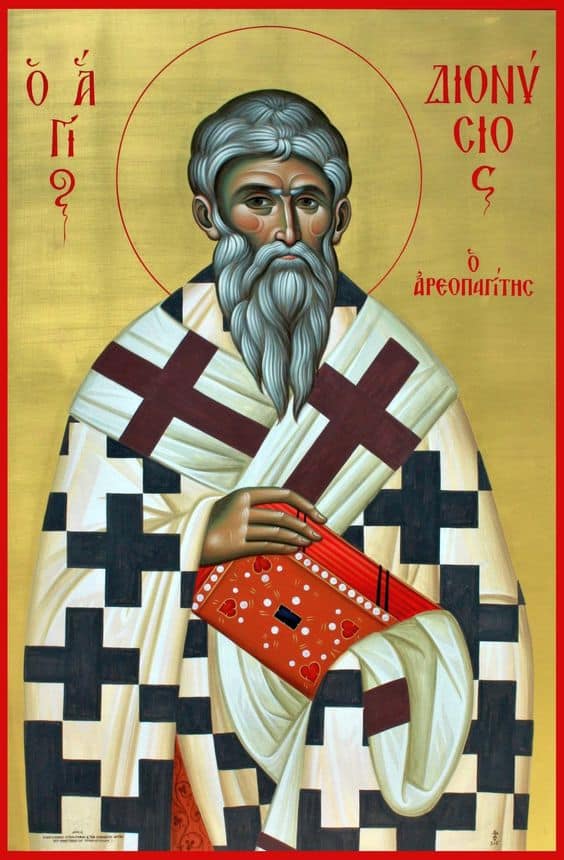St. George’s Day (Gergyovden), celebrated on May 6, is one of Bulgaria’s most cherished holidays. It beautifully weaves together Christian […]
Saint Dionysius the Areopagite

History and Name Day Celebration in Bulgaria
On October 3rd, the Orthodox Church honors the memory of Saint Dionysius the Areopagite, one of the first Christian bishops of Athens and a martyr for the faith. This day is associated with the name day celebrations of people bearing the names Dionysius, Denis, Denislav, Denislava, and their variations. This day is celebrated in Bulgaria with respect for the spiritual heritage of Christian tradition and the symbolism tied to these names.
History of Saint Dionysius the Areopagite
Saint Dionysius the Areopagite was a disciple of Apostle Paul and one of the first bishops of Athens. According to the Book of Acts (Acts 17:34), Dionysius was among the few who accepted the Christian faith after Paul’s speech at the Areopagus, the ancient judicial and religious center of Athens. Dionysius became a devoted follower of Christianity and later died as a martyr for his faith. He was canonized as a saint for his dedication to Christ’s teachings and his episcopal work.



Name Day on October 3rd: Who Celebrates?
On October 3rd, people with the names Dionysius, Denis, Denitsa, Denislav, Denislava, and their variations like Deni, Diana, Diya, and others celebrate their name day. All of these names derive from the ancient Greek name Dionysios, which is linked to the god of wine and joy, Dionysus, and later adapted into the Christian tradition through Saint Dionysius the Areopagite.
Origin and Meaning of the Names
The name Dionysius comes from the ancient Greek "Dionysios," meaning "dedicated to the god Dionysus." Dionysus was the Greek god of wine, fertility, joy, and the arts. In Christian tradition, the name Dionysius took on new meaning, connected to the Christian martyr and saint who preached the faith and symbolized devotion to God.
The names Denis, Denislav, and Denislava are variations of Dionysius and carry similar symbolism of joy, strength, and devotion. Today, these names are associated with success, creativity, and spiritual stability, thanks to their ancient history.
Are There Any Specific Traditions?
In Bulgaria, name days are an important part of folk traditions and customs, and people bearing these names usually host celebrations with family and friends. Although Saint Dionysius the Areopagite’s day is not linked to specific folk rituals, it is customary for the name-bearers to offer their guests food and drinks, often including wine, in honor of the day.
There are no specific rituals or customs associated with this name day, but it follows the general Bulgarian traditions for name day celebrations. Family and friends usually gather to congratulate the name-bearer with gifts and wishes for health, happiness, and success.
Why Is This Day Celebrated in Bulgaria?
The feast day of Saint Dionysius the Areopagite is celebrated in Bulgaria as part of the Orthodox Christian tradition, which honors saints and their contributions to the faith and humanity. Saint Dionysius the Areopagite is especially revered for his significant role in spreading Christianity in Athens and for his loyalty to Christ’s teachings, even under the threat of martyrdom.
The symbolism of Saint Dionysius is connected to the power of faith, wisdom, and spiritual energy, which saints pass on to future generations. Celebrating name days in Bulgaria is deeply rooted in the country's cultural traditions, providing an opportunity for family and friends to come together, with the name-bearer being the center of attention.
Interesting Facts about Saint Dionysius and the Celebration
- The name Dionysius is popular worldwide, with variations like Denis in France, Dennis in the UK and USA, and similar forms in Slavic countries such as Bulgaria, Russia, and Serbia.
- Saint Dionysius the Areopagite is not only a saint but also an important figure in early Christian philosophy. His writings, known as the "Areopagite corpus," have greatly influenced Christian mysticism and theology.
- According to some beliefs, Dionysius was present at the crucifixion of Jesus Christ, although this claim is debated by historians.
